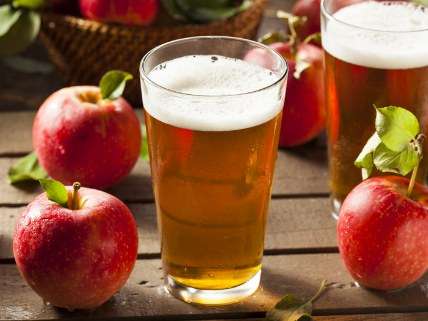Feds' Rules Tell Cider Makers to Shut Up About Vintage Years on Labels
Producers prohibited from sharing information with consumers about the year their apples were harvested.


In The Cider House Rules, John Irving's 1985 novel, the guidelines to which the book's title refers are a set of rules posted in the Maine cider house where much of the book's action takes place.
"Please don't go up on the roof if you've been drinking—especially at night," reads one such rule. These rules, posted by management to govern the behavior of the workers in the cider house, are mostly ignored by those same workers, who live by their own set of rules.
If workers in a fictional cider house are subject to an array of sometimes-sensible rules they often ignore, real-world cider-house management is stuck having to comply with oftentimes-idiotic rules for which compliance is not optional.
I'm talking about government rules, of course. And these rules, you may be surprised to learn, can be complicated.
The Alcohol and Tobacco Tax & Trade Bureau (TTB), is housed within the Treasury Department and is charged with drafting and enforcing rules for hard cider. A 2016 TTB presentation, Cider Industry Federal Compliance Training, makes light of its complicated rules a handful of times, as here:
"How Does TTB Regulate Cider… Products?
…it's VERY complicated!"
It is! It is! Maddeningly so.
Space (and frustration, and lack of interest) doesn't permit me to elaborate on the lengthy discussion of the rules. But I want to highlight something that somehow didn't make the cut in that 244-page TTB presentation: TTB's unconscionable ban on disclosing a cider's vintage.
Nick Hines, a staff writer with VinePair, which covers alcohol beverages, wrote a great piece earlier this month on the frustration the TTB vintage ban causes for cider makers. It follows earlier calls, in publications like the Cider Journal, to lift the ban. That ban, which Hines notes dates back to Prohibition, results from a set of overlapping rules.
"On the TTB and FAA websites, cider is still labeled as a fruit wine, meaning it must be 'produced by the normal alcoholic fermentation of the juice of sound, ripe apples,'" Hines writes. "But when it comes to the TTB's labeling laws, only grape wine can use the 'vintage' labels."
In other words, cider is fruit wine, but only grape wine can list its vintage.
Why might a cider's vintage—the year its apples were harvested—matter? For the same reasons a wine's vintage might.
"The variety comes from the way the blend of apples used from the start and the way the cider is fermented, stored, and aged," explains a 2015 blog post from cider makers Ash & Elm. "Variety also comes from the vintage of the apples as well, just like wine—some years are great growing years, others aren't, and the soil and ecological conditions where apples and grapes are grown affect the flavor of the cider or wine from year to year."
Consumers want to know. And producers want them to know. Shy not allow a company like Ash & Elm the freedom to display their cider's vintage?
"Cider makers should be able to put a vintage on their cider bottles if they feel like it accurately describes their product," VinePair's Hines told me this week by email. "A vintage can help a consumer understand what's inside the bottle, and how it can vary from year to year. The regulation of alcohol and its marketing is important in terms of health and accuracy, but I couldn't figure out a real purpose for keeping vintages off cider bottles."
It certainly sounds like a rule designed to do nothing more than to protect the grape wine industry.
The freedom to display cider vintages exists in other countries. You can buy a 2015 vintage cider from your local ASDA grocer in England, for example. Such vintages have been around for a long time, too.
"[C]ider of a good vintage year will fetch a high price," notes an 1889 U.S. government publication on English cider production.
Are today's TTB rules simply outdated--a vintage holdover of Prohibition-era lawmaking? That's charitable. I think they were never a good idea in the first place. They're clearly not helping cider makers or consumers. And they should be repealed at once.
"The beverage market is expanding," Hines tells me. "The general public isn't limited to choosing between beer, wine, and a common spirit anymore. Rules that govern alcohol and its marketing should reflect that."
Note: I've employed this very low-tech hard cider recipe to make tasty batches at home.


Show Comments (74)